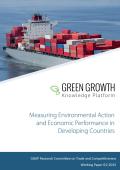This study attempts to contribute to the growing research on green supply chain management (GSCM) strategies by relying on the Natural Resource Based View (NRBV) and relational view. Specifically, this study investigates the role of collaborative capability in moderating the effects of GSCM practices on firm performance. Using hierarchical regression, this study analyzes data from a survey of 230 South Korean manufacturers. The results show that the implementation of GSCM practices can improve both environmental and financial performance of the firm. Also, the findings indicate that firms can expect improved financial performance when they seek a synergistic effect by involving their partners in the GSCM implementation process.
The report presents the findings of research on the perceptions of agri-food exporters of climate change. It provides direct insight into the perceived needs of business and exporters in responding to climate change impacts in Uganda and Peru, to inform ITC, its clients and other Aid for Trade practitioners on strategies to mainstream climate resilience among exporters and to improve the effectiveness of support for adaptation. Part 1 on Uganda shares the perceptions of agri-food exporters in key export sectors including coffee, tea, cocoa, cotton, fruits and spices. Part 2, on Peru, shares the perceptions of agri-food exporters in the coffee and cocoa sectors.
This handbook aims to foster a better understanding of the interlinkages between international trade, the environment and the green economy. It therefore focuses on national and international trade policy and rules, on environmental governance and principles, and the relationship between both. This third edition of Environment and Trade: A Handbook covers a wealth of new information, including the emergence of the green economy concept, the latest WTO jurisprudence, and increasingly important legal and policy linkages between trade and green economy policies and practices in the changing dynamics of international trade with the emergence of the BRIC economies and the exponential rise in preferential trade agreements. The handbook has been renamed Trade and Green Economy: A Handbook to reflect the green economy as an important tool for achieving sustainable development and poverty eradication, and to illustrate the holistic approach that is required when addressing issues at the nexus of trade, environment and sustainable development.

